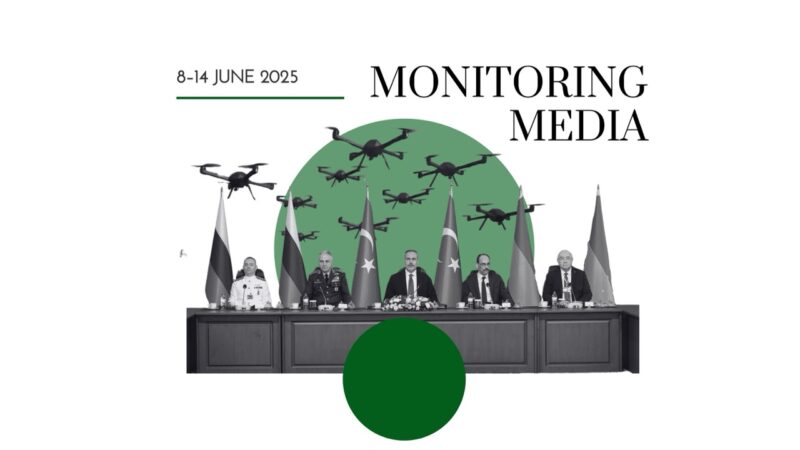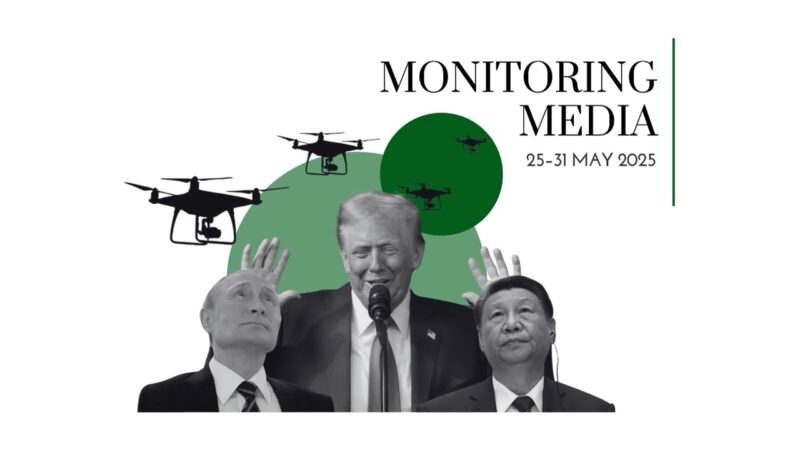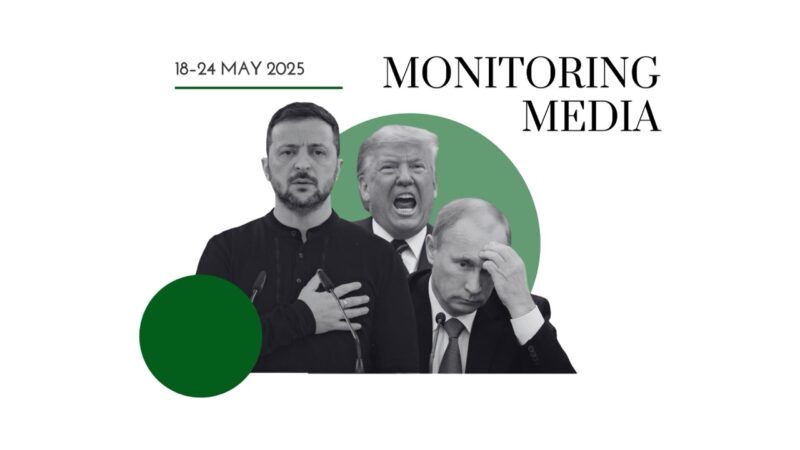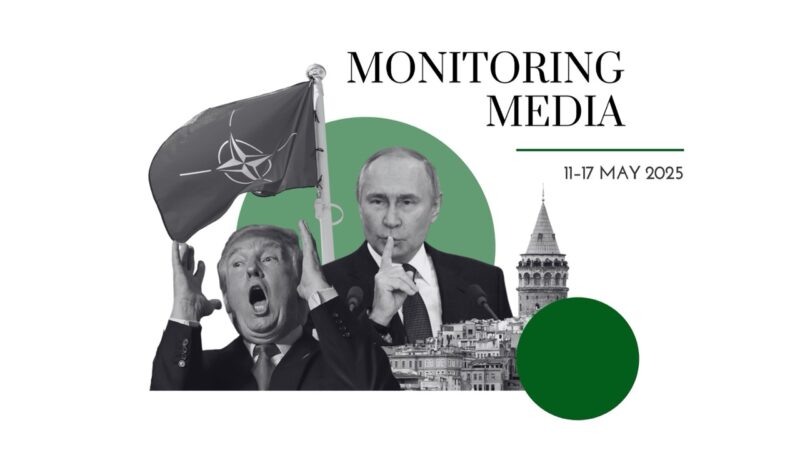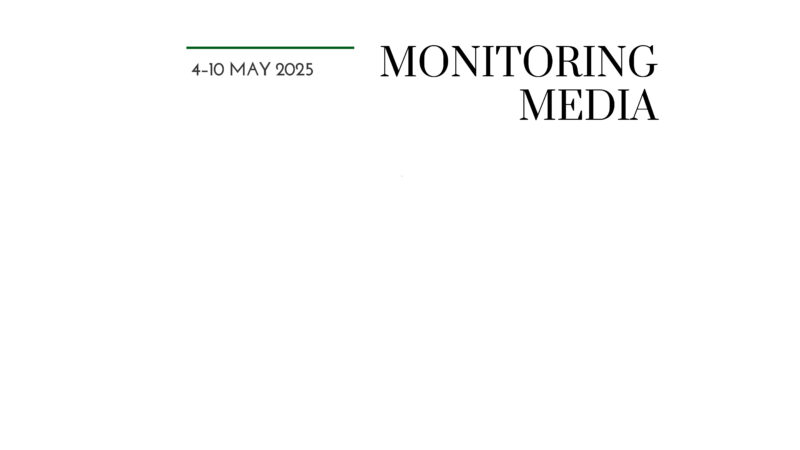Ukraine’s war effort reduces Russia’s threat to Western Europe

CIUS weekly report on media coverage of Ukrainian affairs, 10–16 December 2022
Three publications (Atlantic Council, The Wall Street Journal, and The New York Times) were selected to prepare this report on how the situation in Ukraine has been portrayed in the press during the past week (10–16 December 2022). The sample was compiled based on their impact on public opinion as well as on their professional reputation, popularity among the readership, and topical relevance. These three publications represent centrist and liberal viewpoints on the political spectrum.
This report covers only the most-read and relevant articles about Ukraine, as ranked by the respective publications themselves in the past week. Its scope covers promoted articles on home pages and articles from special sections on Ukraine, with the hashtag #Ukraine, from the paper editions of the publications, and about Ukraine from opinion columns and editorials.
Topics featured in the selected articles:
- Ukraine’s current affairs: Ukraine needs to complete judiciary reforms regardless of the ongoing war;
- The world and Ukraine: Pope compares Russian invasion to the Holocaust; US uses the war as a prompt to re-arm itself and revise its security doctrines; US would benefit from Ukraine’s victory for decades to come; NATO’s enlargement not a legitimate provocation for the Russo-Ukrainian War; the West must increase its support for Ukraine, stop being afraid of Russia’s disintegration, and develop mechanisms to bring Russian war criminals to justice;
- Russia at war: Russians have mined 65,000 square miles of Ukraine’s territory; Russians bombard Ukraine with missiles that Ukraine ceded under the Budapest memorandum; Putin’s decision to invade Ukraine has been his own “biggest geopolitical catastrophe” so far; radical nationalist movements are on the rise in Russia.
The most common arguments:
Judiciary reforms in Ukraine should be completed in a consistent manner and regardless of the war. Mykhailo Zhernakov and Nestor Barchuk (Atlantic Council) argue that “judicial reform was identified as one of Ukraine’s top reform priorities when the country received official EU candidate nation status in summer 2022. The High Qualification Commission of Judges (HQCJ) and the High Council of Justice (HCJ) are encompassed by the judicial reform agenda. The former is responsible for selection of judges, while the latter deals with appointments, dismissals, and disciplinary issues.” According to Zhernakov and Barchuk, if new members of the HCJ are not elected by the end of January 2023, the body will not be able to root out Russian collaborators in the judiciary. At the same time, once HCJ and HQCJ members are elected, they will need to appoint around 3,000 judges within a few months. This wave of appointments will impact the Ukrainian judiciary for decades to come; therefore, the control over the HCJ today remains the focus of struggles between political actors and has led to many delays. Another issue hurting judiciary reform is an unfortunate opinion of the Venice Commission of the Council of Europe on Ukraine’s Constitutional Court. The Commission acknowledged that the Russo-Ukrainian war impacts the national political agenda and raised mere recommendations instead of binding conditions for reforms, specifically regarding transparency of the selection process of judges. However, as Zhernakov and Barchuk believe, “without additional safeguards…only government-friendly candidates can be appointed to the Constitutional Court.” In other words, the acting government in Kyiv may acquire a green light from the West to secure a majority in the Constitutional Court of Ukraine for the next nine years. Zhernakov and Barchuk have encouraged international partners of Ukraine to be cautious in issuing opinions, as well as Ukraine’s civil society to pressure the government in Kyiv so that only well-thought and balanced reform proposals become laws.
Pope Francis condemns the Russian invasion of Ukraine as a genocide on the scale of the Holocaust. Francis X. Rocca (Wall Street Journal) writes that last week the primate of the Catholic Church compared the Russian invasion of Ukraine to the Nazi extermination of the Jews. By doing so, he risks “aggravating tensions between the Vatican and Moscow following the pope’s earlier comparison of the war to Soviet-instigated genocide and his characterization of ethnic-minority Russian troops as especially cruel.” Earlier, the Pope had compared Russia’s ongoing atrocities in Ukraine to Stalin’s Holodomor, a terror-famine in the 1930s, which he called a genocide. The Russian side has yet to respond to the Pope’s Holocaust comparison. That being said, the experts whom Rocca interviewed believe that in light of “the unjustified military aggression of one country against another—we can speak, in some sense, of history repeating itself” and that the Russian atrocities in Ukraine resemble the Holocaust. Rocca also highlights that the Catholic primate avoids blaming Putin for authorizing the invasion, excusing this laxity in the words of the Pope himself: “it is well known whom I am condemning. It is not necessary that I put a name and surname.” Finally, Francis believes that the cruellest crimes in Ukraine are committed by Buryat and Chechen soldiers, representatives of Russia’s non-Christian minorities.
US using Russo-Ukrainian war to reassess and replenish its stockpiles of ammunition. Doug Cameron (Wall Street Journal) writes that in light of the changes in the Russo-Ukrainian war and depletion of US stockpiles of ammunition, the Pentagon is reassessing its strategy of supporting Ukraine and safeguarding American citizens: “Defense contractors have said a combination of workforce shortages, obsolete production lines and supply-chain issues caused by the Covid-19 pandemic and the Ukraine conflict have left the U.S. with years of catch-up to do.” That being said, the US will probably use this war as an exigent opportunity to mitigate its existing shortages and redesign its arms supply systems for the future. The Russo-Ukrainian war has evoked bipartisan support in the US for rearmament—in particular, doubling production of the Javelin anti-tank missiles and expanding the output of Himars rocket launchers. That being said, re-orientation of the US defence industry from peaceful times’ moderate production capacities to conditions of increased demand may take years and cost billions of US dollars. Cameron also writes that “the Pentagon is trying to determine whether Russia poses less of a threat to U.S. interests than before the war because it has used so much of its own weaponry fighting the Ukrainians, a finding that could potentially require [NATO] members to hold less ammunition in reserve.” It may happen that the shortages of ammunition in the US are de facto comparatively minor, but new estimates are needed. Some of the US weaponry may be produced by contractors overseas.
It is in the US’s national interest to support Ukraine until it is victorious over Russia. In his opinion column, Nicholas Kristof (New York Times) denounces the arguments of US citizens and analysts who believe that their state should curtail its military support to Ukraine. Kristof considers that it is not Americans who are doing a favour to Ukraine by arming it, but rather Ukraine who is doing a favour for Americans by protecting them and maintaining the stability of the Western world order. Kristof encourages his fellow Americans to “grow a spine” against Russia and acknowledge the following arguments. First, by sacrificing the lives of its own people and its infrastructure, Ukraine has diminished Russia’s military threat to NATO and Western Europe. In other words, according to general Wesley Clark whom Kristof cites, Ukrainians are “fighting our fight.” Secondly, if Russia prevails in Ukraine, many governments across the world will move to authorize their own sovereign nuclear programs. Ukraine—a state that willingly gave up its nuclear arsenal in the 1990s—is shining a spotlight on how the West is incapable of protecting its ward against a nuclear bully. Thirdly, if Russia prevails in Ukraine, this could encourage China to start military action against Taiwan. Such a development will require more direct US engagement and will come at a higher cost to US citizens. However, if Russia loses in Ukraine, China will also feel more restrained in resorting to aggression. Kristof believes that “bowing to nuclear blackmail and rewarding an invasion would create their own risks for many years to come, and on balance those dangers seem greater than those of maintaining the present course.” He concludes his piece with an appeal to Americans: “let’s not let Russia beat the Ukrainian out of us: The world could use a spinal transplant from brave Ukrainians.”
NATO enlargement has never posed a threat to Russia and must not be considered an acceptable provocation to invade Ukraine. Peter Dickinson (Atlantic Council) scrutinizes French President Emmanuel Macron’s statement that the West should provide Russia with security guarantees in a future security architecture of Europe. This statement reiterated the Kremlin’s major narratives and indirectly hinted that Russia had invaded Ukraine exactly because it felt threatened by NATO. Dickinson addresses the process of NATO enlargement into Central and Eastern Europe, a region considered by the Kremlin as its privileged zone of influence; he concludes, however, that such an enlargement is not a legitimate reason to for the Russian invasion. NATO has never tried to deploy a significant number of troops near Russian borders. NATO did not accept the membership applications of Ukraine and Georgia in 2008 to the Kremlin’s benefit. In the 2000s, Putin himself pondered Russia’s membership in the alliance. Finally, if the Kremlin was so worried about NATO’s aggressive nature, it would not re-deploy troops from the Finnish border to Ukraine after Finland applied for NATO membership in 2022. Dickinson concludes that “Russian complaints over NATO enlargement are not only a reflection of Moscow’s frustration. Crucially, these complaints also serve as a highly effective smokescreen for imperial aggression. While Kremlin efforts to portray the attack on Ukraine as an anti-Nazi crusade or a war on Satanism have invited ridicule, attempts to blame NATO have proven far more effective. International audiences conditioned by decades of Western geopolitical dominance have been all too willing to believe that the West must also be somehow responsible for Russia’s decision to invade Ukraine” [emphasis ours—Ed.] In this light, Macron risks validating fake Russian concerns, as it is only Ukraine that requires security guarantees.
The West should step up aid to Ukraine for a quicker resolution of the ongoing war. In his opinion piece for The Wall Street Journal, Boris Johnson (British Prime Minister 2019–22) argues that “the war in Ukraine can end only with Vladimir Putin’s defeat. Russian forces must be pushed back to the de facto boundary of Feb. 24.” Johnson puts forward a few arguments to back his position. Primarily, it is morally wrong to observe the deaths of thousands of Ukrainian civilians from Russian missiles and drones, as well as from freezing temperatures in unheated homes during winter. Secondly, the longer the war continues, the more destabilized the global economic system becomes. Thirdly, every day of delay in support of Ukrainians makes Russia’s gas diplomacy more effective against the EU states, who will likely feel the shortage of energy resources in the winter of 2023/24. Johnson encourages the West to provide Ukraine with efficient air defence systems and not be afraid of irritating the Kremlin: “I know the wearying counterargument that stepping up supplies to Ukraine risks escalation. We dare not risk ‘poking the Russian bear.’ Surely to goodness, after almost a year of this hideous conflict, we can see what total nonsense this is.” Johnson concludes with a statement that sounds similar to what Peter Dickinson argues: “it was decades of Western lassitude and irresolution about Ukraine’s status that enticed the bully to make his mistake. The West has atoned for this failure with a stunning display of coherence and unity since February. We must be stronger and bolder.”
The West should not be afraid of the breakup of Russia. Yaroslav Trofimov and Matthew Luxmoore (Wall Street Journal) present highlights from their interview with Ukrainian Foreign Minister Dmytro Kuleba, who “called on the country’s allies not to fear a possible breakup of the Russian state as a consequence of the war, while defending Kyiv’s right to strike targets on Russian soil and vowing that Ukraine would never accept a peace settlement that leaves occupied lands, including Crimea, under Moscow’s control.” Kuleba encourages the West not to make the same mistake as US President George H.W. Bush did in 1991, when he urged Ukrainian lawmakers in Kyiv to keep their state within the USSR and forfeit “suicidal nationalism.” The partition of Russia, a nuclear state, is possible as a natural cause and could proceed peacefully without wide-scale unrest. Kuleba expresses the following opinion: “I don’t think the world will fall apart if Russia falls apart. But it will be the people of Russia who will make their country fall apart, as it happened with the Russian Empire in 1917.” Apart from this, Kuleba argues that Ukraine has a right to defend itself by striking deep into Russian territory; the US-supplied missiles and artillery may be used to strike Crimea which Russia illegally declared a part of its sovereignty; “in nine months of fighting, Ukraine’s military has already ousted Russian forces from more than half of the territories that they occupied in the initial weeks of the war”; the Kremlin’s inquiries for peace talks are nothing but attempts to win time and regroup the Russian army for a new offensive; secessions of Ukrainian territory to end the war should never become a part of the peace talks agenda; NATO members should “completely change the optics: Instead of waiting for a crisis in order for them to make a decision, they have to make decisions now in order to avoid a crisis”.
The international community should develop and enforce mechanisms to bring Russian war criminals to justice. Stanislav Aseyev (Atlantic Council) applies the theory of “broken windows” to illustrate that Russia’s full-scale invasion of Ukraine in 2022 was not least stimulated by the weak Western response to Russia’s annexation of Crimea in 2014 and subsequent invasion of the Donbas: “for the past eight-and-a-half years, Russia has been permitted to slowly but steadily challenge and undermine the global security order established in the decades following World War II. For many in the West, this process has been unspectacular and has involved minor inconveniences such as rising food prices and mounting energy bills.” To reverse the aggressive logic of events, Aseyev advocates the necessity of bringing all Russians who committed war crimes to justice. This would be hard to accomplish, as international mechanisms to investigate Russian war crimes and prosecute perpetrators do not exist today: “today’s Russian war criminals are not like the Nazis after World War II, who were scattered around the world. On the contrary, they overwhelmingly live in Russia itself, and have no intention of leaving…[and] Russia will never hand over war crimes suspects within the framework of existing extradition procedures.” Aseyev, himself a participant in three war crime trials against Russians, argues that the international community should focus on developing and enforcing two legal mechanisms: 1. the identification of perpetrators; and 2. their detention and bringing for trial. Without both mechanisms in place, “there is a risk that all the current work being done to collect evidence of Russian war crimes in Ukraine will be futile.”
Russians made the occupied territories of Ukraine the world’s most heavily mined. Isabel Coles (Wall Street Journal) writes that Russians have created in Ukraine the biggest landmine threat since the Second World War by contaminating up to 65,000 square miles of the state’s territory. This concentration of explosives not only prevents the Ukrainian army from swiftly liberating occupied territories, but makes the restoration of peaceful life there impossible before the danger is fully removed. Coles quotes the US officials that “Russian forces have booby-trapped children’s toys and corpses…[similar tactics was] deployed by Islamic State militants in Iraq and Syria.” In this light, as well as acknowledging the shortage of demining teams to cover all areas in Ukraine, the US designated 91.5 million dollars for post-combat mine clearance, training new specialists, purchasing equipment, and hiring external contractors. Demining efforts are currently concentrated in the Kyiv and Chernihiv regions, in the north of Ukraine, from where Russians retreated in March 2022. According to Coles, “Ukraine has more than 200 demining teams, with more than 1,000 personnel, and plans to expand to 400 teams next year.”
Russia deploys old Ukrainian missiles against Ukraine. Marc Santora (New York Times) writes that missiles given to Russia in the 1990s under the provisions of the Budapest Memorandum (i.e., an exchange of Ukraine’s nuclear arsenal for guarantees of the state’s sovereignty and territorial integrity) have been confirmed to strike Ukrainian cities. Russians launch formerly nuclear-capable Ukrainian Kh-55 cruise missiles (with warheads removed), to confuse Ukraine’s air defence system before more precise and modern missiles are launched. There also exists evidence that the bomber planes used to launch Kh-55 also belonged to Ukraine thirty years ago. That being said, according to the calculations of Ukrainian intelligence, Russians are running low on missiles and can possibly afford three to five waves of attacks in future, with 80-90 missiles in each attack. The missile manufacturing capacities in Russia are comparatively low, with no more than 40 items per month. However, this manufacturing continues even regardless of the Western sanctions. When launched, the majority of missiles, up to 80 per cent, are intercepted by Ukrainian air defence forces. Russians know this and, to increase their effectiveness and inflict more damage, try to improvise. According to Santora, “during large-scale attacks, which have featured up to about 100 missiles launched within minutes of one another, they fly in from all directions at the same time.”
Putin’s decision to invade Ukraine was his major geopolitical blunder. In light of President Volodymyr Zelensky being named Person of the Year by TIME magazine and the Financial Times newspaper, Peter Dickinson (Atlantic Council) pronounces Vladimir Putin the biggest loser of 2022: “His original plan envisaged a short and victorious war that would extinguish Ukrainian independence and force the country permanently back into the Kremlin orbit. Instead, he now finds himself an international pariah with his country’s reputation as military superpower in tatters and his Ukrainian enemies looking forward with growing confidence to the very real prospect of an historic victory in the coming year.” In his article, Dickinson analyzes the disastrous performance of the invading army (defeats in the Battle of Kyiv, the Battle of Kharkiv, and the Battle of Kherson), atrocities that Russians committed in Ukraine, forced and very unpopular mobilization across Russian society, growing international isolation of Russia, and weakening of the Kremlin’s grip over post-communist space. Dickinson argues that 2023 will likely fall out even worse for Putin. The most realistic scenario is that “the well-armed and highly motivated Ukrainian military continue to steadily liberate occupied territory while Russia suffers heavy losses among poorly trained and badly equipped conscript troops. This is a recipe for disaster for the Putin regime.” Dickinson concludes that Putin’s decision to invade Ukraine was one of the “biggest geopolitical blunders of the modern era.” It may also become fertile soil for the ascendance of a new generation of decision-makers in the Kremlin.
Far-right sentiments gaining strength in Russia, in light of its military underperformance in Ukraine. Stanislav Shalunov (Atlantic Council) points to an interesting regularity: the more the Russian army under Putin gets beaten in Ukraine, the higher the public support of aggressive and pro-war far-right movements in Russia. This regularity appeared not least due to the recent Kremlins policies to promote state-centrism, nationalism, and imperialism. Shalunov writes that Putin’s bet on a quick and victorious war in Ukraine was a miscalculation that painfully backfired: “Losing a conflict that you are expected to win is so thoroughly demoralizing that it puts your entire reign at risk…Thanks to decades of propaganda, Russians take it for granted that their country is a military superpower. This myth has been shattered in Ukraine.” However, living in their own reality, Putin and his circle continue claiming that the invasion is developing according to the plan. This delusion does not sound convincing to the public and nurtures support for far-right movements who claim straightforwardly that Russia loses the war and more effort is needed to regain the initiative. One of such far-right heavy-weights is Yevgeny Prigozhin, the leader of the Wagner Group paramilitary force, the fighters of which became “the poster boys of the ultra-nationalists, who are…interested in the realities of hard power.” Shalunov argues that if far-rights come to rule in post-Putin Russia, they “would likely be even more inclined to wage war against Russia’s neighbors while ruthlessly targeting civilians. This extremism would be driven in part by the growing conviction within nationalist circles that Putin is failing in Ukraine precisely because he has not been ruthless enough in his leadership of the war.” Shalunov concludes that the swing to the right in Russia has not been acknowledged by western analysts yet, however, the worrying developments should be addressed as soon as possible.
